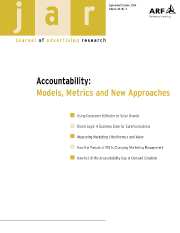Crossref Citations
This article has been cited by the following publications. This list is generated based on data provided by
Crossref.
Taylor, David B.
1983.
The Information Content of Women's Magazine Advertising in the UK.
European Journal of Marketing,
Vol. 17,
Issue. 5,
p.
28.
Tadajewski, Mark
2006.
Remembering motivation research: toward an alternative genealogy of interpretive consumer research.
Marketing Theory,
Vol. 6,
Issue. 4,
p.
429.
Schwarzkopf, Stefan
2007.
‘Culture’ and the limits of innovation in marketing: Ernest Dichter, motivation studies and psychoanalytic consumer research in Great Britain, 1950s–1970s.
Management & Organizational History,
Vol. 2,
Issue. 3,
p.
219.
Boddy, Clive R.
2007.
Projective techniques in Taiwan and Asia‐Pacific market research.
Qualitative Market Research: An International Journal,
Vol. 10,
Issue. 1,
p.
48.
Ehrlich, Matthew C.
2008.
RADIO UTOPIA.
Journalism Studies,
Vol. 9,
Issue. 6,
p.
859.
McLeod, Amanda
2009.
“Pseudo‐scientific hokus pokus”: motivational research's Australian application.
Journal of Historical Research in Marketing,
Vol. 1,
Issue. 2,
p.
224.
Schwarzkopf, Stefan
and
Gries, Rainer
2010.
Ernest Dichter and Motivation Research.
p.
3.
Kozinets, Robert V.
2010.
Wiley International Encyclopedia of Marketing.
Hellmann, Kai-Uwe
2010.
Ernest Dichter and Motivation Research.
p.
173.
Boddy, Cliva R.
and
Soley, Lawrence
2010.
Projective techniques in US marketing and management research.
Qualitative Market Research: An International Journal,
Vol. 13,
Issue. 4,
p.
334.
Gunder, Michael
2011.
A metapsychological exploration of the role of popular media in engineering public belief on planning issues.
Planning Theory,
Vol. 10,
Issue. 4,
p.
325.
Wooliscroft, Ben
Patsiaouras, Georgios
and
Fitchett, James A.
2012.
The evolution of conspicuous consumption.
Journal of Historical Research in Marketing,
Vol. 4,
Issue. 1,
p.
154.
Tadajewski, Mark
2013.
Promoting the consumer society: Ernest Dichter, the Cold War and FBI.
Journal of Historical Research in Marketing,
Vol. 5,
Issue. 2,
p.
192.
Patsiaouras, Georgios
Fitchett, James
and
Saren, Michael
2014.
Boris Artzybasheff and the art of anthropomorphic marketing in early American consumer culture.
Journal of Marketing Management,
Vol. 30,
Issue. 1-2,
p.
117.
Bailey, Lawrence F.
2014.
The origin and success of qualitative research.
International Journal of Market Research,
Vol. 56,
Issue. 2,
p.
167.
Whelan, Bernadette
and
Whelan, Bernadette
2014.
American influences on Irish advertising and consumerism 1900-1960: fashioning Irishwomen.
Journal of Historical Research in Marketing,
Vol. 6,
Issue. 1,
p.
159.
Schwarzkopf, Stefan
2015.
Mobilizing the depths of the market.
Marketing Theory,
Vol. 15,
Issue. 1,
p.
39.
Lee, Yoon-Joo
Haley, Eric
and
Yang, Kiseol
2019.
The Role of Organizational Perception, Perceived Consumer Effectiveness and Self-efficacy in Recycling Advocacy Advertising Effectiveness.
Environmental Communication,
Vol. 13,
Issue. 2,
p.
239.
Williams, Andrew James
Menneer, Tamaryn
Sidana, Mansi
Walker, Tim
Maguire, Kath
Mueller, Markus
Paterson, Cheryl
Leyshon, Michael
Leyshon, Catherine
Seymour, Emma
Howard, Zoë
Bland, Emma
Morrissey, Karyn
and
Taylor, Timothy J
2021.
Fostering Engagement With Health and Housing Innovation: Development of Participant Personas in a Social Housing Cohort.
JMIR Public Health and Surveillance,
Vol. 7,
Issue. 2,
p.
e25037.
Rudeen, Christopher M.
2023.
Ernest Dichter's fur coat models: Fashioning a therapeutic culture.
Journal of the History of the Behavioral Sciences,
Vol. 59,
Issue. 3,
p.
246.




